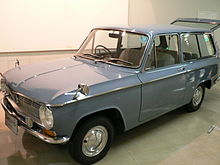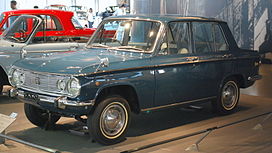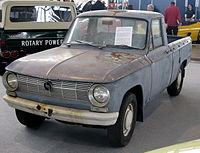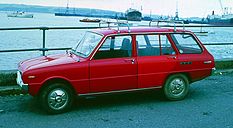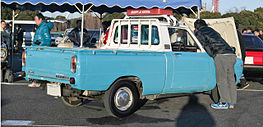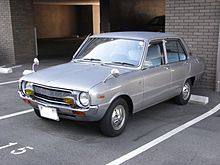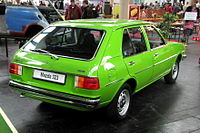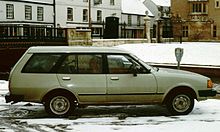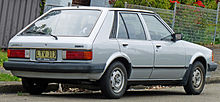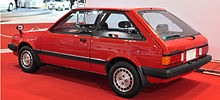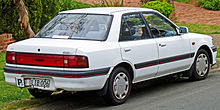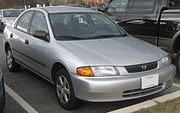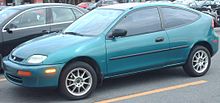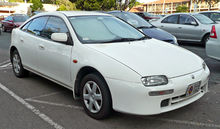- Mazda Familia
-
Mazda Familia 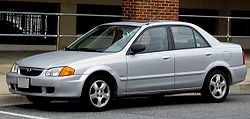 1999–2000 Mazda Protegé ES sedan (US)
1999–2000 Mazda Protegé ES sedan (US)Manufacturer Mazda Production 1964–2003 Successor Mazda Axela Class Small family car
Subcompact (1964–1994)
Compact (1995–2003)The Mazda Familia is a small family car or compact car that was manufactured by Mazda between 1964 and 2003 and marketed in several body styles and under numerous other brands and nameplates.
Other nameplates for the Familia included Mazda 800, 1000, 1200, and 1300, as well as later the 323. In North America, nameplates included GLC, 323, and Protegé. In South Africa, it was marketed as the Étude. In Colombia the 8th generation was called Allegro.
The Familia was also rebranded as the Ford Laser and Meteor in Asia, Australasia some Latin American countries and (from 1991) as the Ford Escort and Mercury Tracer in North America.
Familias were manufactured in Hiroshima, Japan as well as Taiwan, Malaysia, South Africa, Colombia, and New Zealand.
The Familia line was replaced by the Mazda Axela in 2004.
Contents
First generation (1963–1968)
First generation 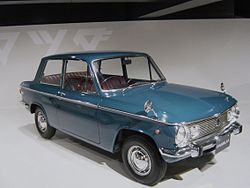
Also called Mazda 800/1000 Production 1963.10–1968.02 Assembly Hiroshima, Japan Body style 2/4-door sedan
2-door coupé
3-door station wagon
2-door ute/pickupLayout FR layout Engine 782 cc SA OHV I4
985 cc PC SOHC I4 (Coupé)
987 cc PB OHV I4Wheelbase 2,190 mm (86.2 in) Length 3,700 mm (145.7 in) Width 1,465 mm (57.7 in) Curb weight 720 kg (1,587 lb) Mazda's automotive plans for the early sixties consisted of growing alongside the Japanese economy. To achieve this goal, they began by building an extremely cheap Kei car, the R360 in 1960, planning on introducing gradually larger and pricier cars as the Japanese customers became able to afford them. As a preview, testing the waters, a larger "Mazda 700" prototype was shown at the 8th Tokyo Motor Show in 1961, and formed the basis for the upcoming Mazda Familia. Meanwhile, the slightly more upmarket Mazda Carol appeared in 1962.[1]
The first production Familia, styled by young Giorgetto Giugiaro while working at Carrozzeria Bertone, appeared in October 1963. In line with Mazda's policy of only gradually approaching the production of private cars (a luxury in Japan at the time), the first Familia was initially only available as a commercial two-door wagon called the Familia Van. The van was joined in April 1964 by a plusher Familia Wagon, in October by a 4-door sedan, and in November by a two-door sedan. The "Flat Deck" design of the sedan versions was reportedly inspired by the Chevrolet Corvair.[2] Private car versions received foglights in the grille as well as more chrome trim. The Familia was sold in other markets as the 800.
The cars used a 782 cc, "SA" four-stroke aluminum inline-four engine, also known as the "White Engine". There was also a pickup version available from November 1964.[3]
An all new Familia 1000 Coupé arrived in November 1965, with a 985 cc SOHC "PC" engine. Around the same time, the 800 engine was upgraded, adding three extra horsepower. As a number of new 1 liter vehicles were introduced by Mazda's competitors, another 987 cc OHV engine (PB) appeared in January 1967, powering new 1000 Sedan and Van versions.[4] The 1 liter sedans and vans are recognizable by their broader, rounded-off rectangular headlights. Production of the sedan continued until November 1967, while the Van versions continued until they were replaced in February 1968. Around 400,000 of the first Familia were built, 130,473 of which were sedans and coupés.[5] Around 10,000 of the first generation Familia were exported, mainly to Australia and Oceania.[2]
- Data
Primary sources below are listed at the head of each column, information sourced elsewhere is referenced directly in the relevant cells. Data is for models as marketed in the Japanese domestic market.
Mazda Familia (1st generation) Familia (800) Van/Wagon[6] Familia 800 Sedan[6] Familia 1000 Van[7] Familia 1000 Sedan[6] Familia 1000 Coupé[6] Layout Front engine, rear-wheel drive Transmission 4-speed manual 4MT, 2-spd automatic[3] 4-speed manual 4MT, 2-spd automatic[3] 4-speed manual Suspension F/R Coil sprung independent by double wishbones / Live axle and semi-elliptic leaf springs[8] Brakes F/R drums / drums discs / drums Wheelbase 2,140 mm (84.3 in) 2,190 mm (86.2 in) 2,140 mm (84.3 in) 2,190 mm (86.2 in) Length 3,635 mm (143.1 in) 3,700 mm (145.7 in)
DX: 3,765 mm (148.2 in)3,635 mm (143.1 in) 3,700 mm (145.7 in)
DX: 3,765 mm (148.2 in)3,700 mm (145.7 in) Width 1,465 mm (57.7 in) Height 1,390 mm (54.7 in) 1,385 mm (54.5 in) 1,395 mm (54.9 in) 1,385 mm (54.5 in) 1,340 mm (52.8 in) Empty weight Van: 715 kg (1,576 lb)
Wagon: 760 kg (1,676 lb)720 kg (1,587 lb)
DX: 745 kg (1,642 lb)725 kg (1,598 lb) (deLuxe) 720 kg (1,587 lb)
DX: 740 kg (1,631 lb)790 kg (1,742 lb) Engine SA PB PC Water-cooled OHV inline-4, two valves per cylinder SOHC inline-4 Displacement 782 cc (58.0 x 74.0mm) 987 cc (68.0 x 68.0mm) 985 cc (70.0 x 64.0mm) Compression 8.5:1 (1966–67: 9.0:1)[8] 8.6:1 10.0:1 Power (SAE) 42 PS (31 kW) at 6,000 rpm (1966–67: 45 PS, 33 kW)[2] 52 PS (38 kW) at 5,500 rpm 58 PS (43 kW) at 6,000 rpm 68 PS (50 kW) at 6,500 rpm Torque 6.0 kg·m (59 N·m; 43 lb·ft) at 3,200 rpm 1966–67: 6.3 kg·m (62 N·m; 46 lb·ft) at 3,200 rpm
8.0 kg·m (78 N·m; 58 lb·ft) at 3,000 rpm 7.9 kg·m (77 N·m; 57 lb·ft) at 3,500 rpm 8.1 kg·m (79 N·m; 59 lb·ft) at 4,600 rpm Top Speed 105 km/h (65 mph)[5] 115 km/h (71 mph) 125 km/h (78 mph) 135 km/h (84 mph) 145 km/h (90 mph) Tires Wagon: 6.00 x 12 4PR Van (f): 5.00 x 12 4PR Van (r): 5.00 x 12 6PR
6.00 x 12 4PR front: 5.00 x 12 4PR rear: 5.00 x 12 6PR
6.00 x 12 4PR 6.15 x 13 4PR
Second generation (1967–1977)
1967–1973
Second generation 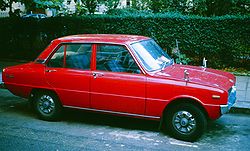
Mazda 1000 (Familia) 4-door sedanAlso called Mazda 1000/1200/Mazda 1300
Kia BrisaProduction 1967–1977 Assembly Hiroshima, Japan Body style 2/4-door sedan
2-door coupé [9]
2-door pickup[10]
2/4-door station wagonLayout FR layout Engine 987 cc PB I4
1,169 cc TB I4 (pre-facelift)
1,272 cc TC I4
2 x 491 cc 10A rotary[11]Wheelbase 2,286 mm (90.0 in) Length 3,962 mm (156.0 in) Width 1,600 mm (63.0 in) Curb weight 810 kg (1,786 lb) Related Mazda R100 The new Familia appeared in 1967 with the same pushrod 987 cc engine as used in the previous generation sedans. It was sold as the Mazda 1000 in some markets. A larger 1,169 cc I4 engined version came along later, becoming the Mazda 1200 for export. In this form, the car was first exhibited in Europe at the 1968 Paris Motor Show in the Autumn/Fall of that year.[12]
From 1970 on the Familia was also available with the new overhead camshaft 1.3 L TC engine, derived from the smaller 1 liter OHC engine already seen in the first generation Familia Coupé. This, exported as the Mazda 1300, replaced the 1200 model in most markets.
Engines:
- 1968–1973 – 1.0 L (987 cc) PB I4, 50 hp (37 kW; 51 PS) / 56 ft·lb (76 N·m)
- 1968–1970 – 1.2 L (1,169 cc) TB I4, 58 hp (43 kW; 59 PS) / 94 ft·lb (127 N·m)
- 1970–1973 – 1.3 L (1,272 cc) TC I4, 2 barrel, 69 hp (51 kW; 70 PS) / 67 ft·lb (91 N·m)
The "1200" was offered in the United States in 1971 and again for the 1973 model year. The 1971 version was the first piston-powered Familia sold in the United States and arrived alongside its rotary R100 counterpart in two- and four-door forms. It was replaced by the somewhat larger 808 (Grand Familia) the next year. The 1200 model returned for 1973 as the base-model economy Mazda. The company then focused on performance for the next two years, dropping the economy car. After the gas crisis they returned to the economy sector with the Mizer in 1976, a rebadged 808.
Engine:
- 1971, 1973 – 1.2 L (1,169 cc) I4, 58 hp (43 kW; 59 PS) / 69 ft·lb (94 N·m)
In 1968 Mazda added a Familia Rotary model to the range, offered in both two-door coupé and four-door sedan variants.[11] The Familia Rotary was powered by a 2 x 491 cc 10A Rotary engine[11] and the coupé version was sold outside of Japan as the Mazda R100.[13] Production ended in 1973.
1973–1977
The September 1973 Familia Presto was an updated version of the second generation Mazda Familia, with somewhat wider bodywork and reworked front and rear designs. These changes were made only to the sedans and coupé, with the van/wagon and trucks retaining the original bodywork. Developed to meet new stricter emissions standards in the domestic market, the Presto featured the 1,272 cc TC engine or the by now familiar pushrod 1 liter PB unit. Power outputs in Japan (gross) were 83 PS (61 kW) and 62 PS (46 kW) respectively. The Rotary Coupé was discontinued, having been replaced by the larger Grand Familia-based RX-3/Savanna.
Production of the second generation Familia ended in January 1977, but not before another minor facelift and emissions scrubbing had taken place in February 1976. After this change, only the larger engine was available, now with 72 PS and labelled Familia Presto 1300AP (for "Anti Pollution").
- Kia Brisa
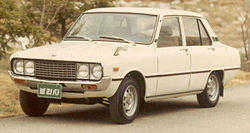
Facelited Kia Brisa 1000From October 1974 until 1981, Kia Motors manufactured a variant of the second generation Familia as the Kia Brisa at their first integrated automobile manufacturing facility, the Sohari Plant in Gwangmyeong, South Korea.[14] Production originally commenced in 1973 in the form of the Brisa B-1000 pickup truck, but passenger car production (originally as the "Brisa S-1000") only commenced later.[15] Brisa comes from the Portuguese word for "breeze". Originally equipped with a 62 PS (46 kW) 1 litre Mazda engine, the bigger 1.3 litre version with 72 PS (53 kW) arrived in October 1975 as a response to Hyundai's successful Pony.[15] A station wagon model was added in 1978. Production came to an end after the new military dictator Chun Doo-hwan enforced industry consolidation, meaning Kia had to give up passenger cars and focus entirely on light trucks.[16]
A facelifted version of the Brisa received a slightly different front end from the original Familia, featuring twin headlights. In total, 31,017 Brisa passenger cars were built.[17] Including the pickups increases the totals to 75,987,[18] of which a total of 1,526 were exported.[15] Exports, Kia's first, began with a shipment of 31 Brisa B-1000 pickups to Qatar in 1975.[18][19] The larger Grand Familia/818 was also built by Kia with the 1,272 cc engine, originally as the Brisa II and later as the K303.
Third generation (1977–1980)
Third generation 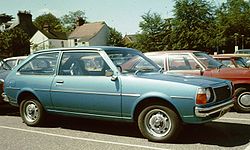
Also called Mazda 323
Mazda GLC
Mazda MR90, Baby Boomers
Mazda VantrendProduction 1977.01–1980 (hatchback)
1977–1986 (wagon)Assembly Hiroshima, Japan Body style 3-door hatchback
5-door hatchback
3-door station wagon/van
5-door station wagonLayout FR layout Engine 985 cc PC I4
1,272 cc TC I4
1,415 cc UC I4
1,597 cc 4G32 I4 (SA)Wheelbase 2,311 mm (91.0 in) Length 3,820 mm (150.4 in) Width 1,595 mm (62.8 in) Curb weight 812 kg (1,790 lb) The Familia AP (323 in most of the world, GLC or Great Little Car in North America) debuted in January 1977 as a rear wheel drive subcompact, replacing the Grand Familia (818). There was a choice of hatchbacks and station wagon bodies, both available with a 3 or 5-door bodystyle. Three Mazda engines were available, the 985 cc PC, 1,272 cc TC, or 1,415 cc UC. It shared many parts with the older Mazda Grand Familia. This was the first appearance of the 323 name.
In South Africa a 1,600 cc model was available – however this model did not have a Mazda engine, unlike the rest of the range. To satisfy that country's local content regulations, a Mitsubishi Saturn 1.6 litre unit was used.
The range was replaced in 1980, however the station wagon models continued in production until 1986. In 1981 a facelift was given to the wagon range, to give a front end treatment similar to Mazda's front-wheel drive 323/Familia range.
It was available in several body variants:
- Five-door four-seat hatch.
- Three-door four-seat hatch.
- Five-door four-seat station wagon.
- Three-door four-seat station wagon.
- Three-door two-seat van with an extended roof profile.
Several of these were available in several trim levels.
Engines:
- 1.0 L PC, 45 PS (33 kW; 44 hp) / 51 ft·lb (69 N·m) – export only
- 1.3 L TC (1977.01–1978) 60 PS (44 kW; 59 hp) / 72 PS (53 kW) in Japan[20]
- 1.4 L UC (1978.03–1980) 83 PS (61 kW) in Japan[20]
A five-speed manual gearbox was introduced later as an alternative to the original four-speed manual gearbox. At the same time the original 7-inch (178 mm) round sealed beam headlights were replaced with square sealed beam units on all models except the van, together with a general styling and mechanical upgrade. A three-speed automatic gearbox was also available throughout the model run.
When the next generation front-wheel-drive Familia/323/GLC models were released in 1980, the wagon and van models continued unchanged, due to Mazda not developing wagon models for the newer range. A facelift however was given to the wagons in 1981, which gave the models the front clip (albeit with different bumpers) of the front-wheel-drive models. Production of the wagons continued to 1986, when a new front-wheel-drive model was introduced.
For the United States, the GLC, advertised as the Great Little Car, was only offered with one engine at a time. The new GLC overlapped with the old-style Mizer for part of 1977 and was produced through 1980 before being replaced by the next-generation GLC. The marketing campaign in the U.S. had the words "Great Little Car" set to the tune of Spanish Flea.
In Indonesia the Familia was marketed by IndoMobil Group as Mazda MR90 (hatchback) between 1990[21] and 1992, Baby Boomers (hatchback) between 1992 and 1994, and Vantrend (station wagon) between 1993 and 1997. The versions built by Mazda Motor Indonesia used the larger Mazda 626's "GC" platform, and later versions had modernized headlights (same as on the North American market GC 626) and bumpers. Only the UC 1.4 litre engine was offered, in combination with a five-speed transmission.
Fourth generation (BD; 1980–1984)
Fourth generation (BD) 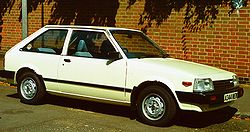
Also called Mazda 323
Mazda GLCProduction 1980–1984
1984–1986 (Colombia)Assembly Hiroshima, Japan
Hofu, Japan
Bogotá, ColombiaBody style 3-door hatchback
4-door sedan
5-door hatchbackLayout FF layout Engine 1.1 L E1 I4
1.3 L E3 I4
1.5 L E5 I4Related Ford Laser
Ford MeteorThe BD Familia, first shown on 2 June 1980,[22] was entirely new – it was Mazda's first front-engine, front-wheel drive subcompact car. It was available as a hatchback and sedan. It was developed with input from Ford, which in 1979 had acquired a stake in the Japanese manufacturer, and had a twin called the Ford Laser (and Ford Meteor, for its four-door model in Australia). The all new Mazda E engine-series was developed expressly for the BD and was offered in three different displacements. The smallest 1.1 liter E1 unit was reserved for certain export markets where the tax structures suited it. Chassis codes were BD1011/BD1031/BD1051 depending on the engine installed.
Engines:
- 1.1 L (1,100 cc) E1, 1 barrel, 55 hp (41 kW; 56 PS) / 58 ft·lb (79 N·m)
- 1.3 L (1,300 cc) E3, 2 barrel, 68 hp (51 kW; 69 PS) / 70 ft·lb (95 N·m)
- 1.5 L (1,500 cc) E5, 2 barrel, 75 hp (56 kW; 76 PS) / 85 ft·lb (115 N·m)
- 1.5 L (1,500 cc) E5S, 2x2 barrel, 85 hp (63 kW; 86 PS) / 88 ft·lb (119 N·m)
For the Japanese market two other top end models were offered, the 2-door Familia XGI with a 1,500 cc single cam, multi-point fuel injected engine and an XGI Turbo R with a turbo added. Its twin the Ford Laser S were also offered with the same specifications but in limited numbers.
This particular Familia was a strong comeback for Mazda in the Japanese market, even outselling the Toyota Corolla on several occasions.
The 1980 Familia/323 was the first front-engine, front-wheel drive vehicle from Mazda since the R130. This generation of 323 was Wheels magazine's Car of the Year for 1980. A station wagon version, which was simply a facelifted version of the previous rear-drive model (with square headlights), was sold in parallel with the BD. The wagon was available with either three or five doors and was equipped either with the old 1,272 cc TC engine or the newly developed 1,490 cc E5 engine, producing 60 PS (44 kW) and 70 PS (51 kW) respectively.[22]
The equivalent American GLC appeared in 1981. It was only offered with a single engine (the 2 barrel 1.5 L) and lasted through 1985, after which it was replaced by the next-generation Mazda 323 and the GLC nameplate was retired. It was the only front-wheel drive Mazda vehicle using the GLC name.
Fifth generation (BF; 1985–1989)
Fifth generation (BF) 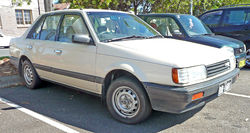
Also called Mazda 323
Ford Tonic
Sao PenzaProduction 1985–1989,1986–2004 in Colombia Assembly Hiroshima, Japan
Hofu, Japan
Bogotá, Colombia
Silverton, South Africa
Rayong, ThailandBody style 2-door cabriolet
3-door hatchback
4-door sedan
5-door hatchback
5-door station wagon
2-door pickup (South Africa)Layout FF layout
four-wheel driveEngine 1.5 L E5 I4
1.6 L B6 I4
1.6 L B6T I4 turboTransmission 3-speed automatic
4 or 5-speed manualWheelbase 2,400 mm (94.5 in) Length Hatchback: 4,110 mm (161.8 in)
Sedan & Wagon: 4,310 mm (169.7 in)Width 1,645 mm (64.8 in) Height Sedan & Hatchback: 1,390 mm (54.7 in)
Wagon: 1,430 mm (56.3 in)Curb weight 936 kg (2,064 lb) Related Mazda Étude
Ford Laser
Mercury TracerThe 1985 (January) Familia featured many updates. It was available as a hatchback or sedan only for the first year, a wagon being added in November 1985. In January 1987 a personal coupé version with its own bodywork, the Étude, was added. In February 1987 the Familia range underwent a light facelift that included replacing the old E engines with the more modern B series.[23]
The 1985 Familia spawned a Ford Laser twin sold in the Asia-Pacific. The Laser sedan and wagon were nearly identical to the Familia but with a Ford grille. By contrast the Laser hatchback model, which was sold in the U.S. as the Mercury Tracer used completely different panels from the Familia's.
This generation of the Familia/323 was also available in a version with a turbocharged DOHC engine, with either front- or four-wheel drive. The 4WD version, introduced in October 1985, saw some success in rally's Group A category. Regular GTX's (GT-X in Japan) produced 140 PS (103 kW). A limited production homologation special, the GT-Ae, appeared in May 1988 and offered an additional ten horsepower. There was also a 1.7 litre diesel version was also available.
This generation was sold through the 1989 model year in the United States. The wagon continued alongside the succeeding generation in most markets until 1994/95, later updated with a new grille and lights.
The model remained in production in South Africa, as an entry-level model, also being sold as the Ford Tonic until 2003. A locally designed pick-up based on the Familia front end, called the Rustler was also produced, and sold as the Ford Bantam. From 1991 to 1994 Samcor also produced and sold the 323 with the 2.0 L 16-valve DOHC FE engine from the Mazda 626 and badged it 200i. Along with the 2.0 L 16-valve DOHC engine there were upgrades to the suspension and braking system. Still, the 1.6 litre GT-Ae homologation car was more powerful.
In 1991, the South African-made model was exported to the United Kingdom as the Sao Penza and fitted with a 1.3 L fuel injected engine. This South African built model was also sold in Australia between 1989 and 1991 with minor changes, the most noticeable one being the front indicators having a clear color rather than the normal amber. These models where labeled BF as opposed to the next generation's BG.
A factory-built convertible body was introduced in March 1986 in both Mazda 323 and Ford Laser (323 panels from firewall back) versions.
Engines:
- 1985–1987 – 1.1 L (1,100 cc) E1, 2 barrel, 8-valve, 55 hp (41 kW; 56 PS) / 59 ft·lb (80 N·m)
- 1985–1987 – 1.3 L (1,300 cc) E3, 2 barrel, 8-valve, 68 hp (51 kW; 69 PS) / 71 ft·lb (96 N·m)
- 1987–1989 – 1.3 L (1,300 cc) B3, 2 barrel, 8-valve, 66 PS (49 kW; 65 hp) / 74 ft·lb (100 N·m)
- 1985–1987 – 1.5 L (1,500 cc) E5, 2 barrel or EGi, 8-valve, 85 PS (63 kW)/12.3 kg·m (121 N·m) (JDM EGi)
- 1985–1987 – 1.5 L (1,500 cc) E5T, turbo EGi, 8-valve, 115 PS (85 kW)/16.5 kg·m (162 N·m) (JDM only)[23]
- 1987–1989 – 1.5 L (1,500 cc) B5, 2 barrel, 12-valve, 73 hp (54 kW; 74 PS) / 81 ft·lb (110 N·m)
- 1985–1989 – 1.6 L (1,600 cc) B6, 8-valve, 103 hp (77 kW; 104 PS) / 98 ft·lb (133 N·m)
- 1985–1989 – 1.6 L (1,600 cc) B6T, turbo, 16-valve, 143 hp (107 kW; 145 PS) / 138 ft·lb (187 N·m)
- 1985–1989 – 1.7 L (1,700 cc) PN, Diesel, 8-valve, 57 hp (43 kW; 58 PS) / 107 ft·lb (145 N·m)
- 1991–1994 – 2.0 L (2,000 cc) FE-DOHC, EFi, 16-valve, 146 hp (109 kW; 148 PS) (South Africa only)
Sixth generation (BG; 1989–1994)
Sixth generation (BG) 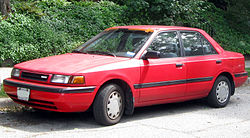
Also called Mazda 323
Mazda ProtegéProduction 1989–1994 Assembly Hiroshima, Japan
Hofu, Japan
Rayong, ThailandBody style 3-door hatchback
4-door sedan
5-door hatchbackLayout Front-engine, front-wheel drive / All-wheel drive Engine 1.3 L B3 I4
1.5 L B5 I4
1.6 L B6 I4
1.8 L SOHCB8 I4
1.8 L DOHC BP I4
1.8 L DOHC turbo BPT I4
1.7 L PN I4 DieselTransmission 3-speed automatic
4-speed F-4EAT automatic
5-speed manualWheelbase Hatchback: 2,450 mm (96.5 in)
Sedan: 2,500 mm (98.4 in)Length Hatchback: 4,155 mm (163.6 in)
Sedan: 4,355 mm (171.5 in)Width Sedan & 1993–94 Hatchback: 1,675 mm (65.9 in)
1990–92 Hatchback: 1,670 mm (65.7 in)Height 1993–94 Hatchback: 1,345 mm (53.0 in)
1993–94 Sedan: 1,340 mm (52.8 in)
1990–92 Hatchback: 1,380 mm (54.3 in)
1990–92 Sedan: 1,375 mm (54.1 in)
AWD Sedan: 1,385 mm (54.5 in)Curb weight 1,070 kg (2,359 lb) Related Mazda Familia Astina
Eunos 100
Ford Laser
Ford Escort/Ford Escort ZX2
Mercury Tracer
Kia SephiaThe sixth generation of Familia included a 3-door hatchback, 5-door fastback, and 4-door sedan variants, none of which shared any body panels. The new 5-door fastback version was called the Familia Astina in Japan and was sold as the 323F or 323 Astina elsewhere. The BF wagon (originally introduced in 1985) was carried over in facelifted form, although Ford marketed a wagon on the new platform as part of the North American Escort line.
The 1989/1990 BG Familia was available in hatchback or sedan formats, with front- or All wheel drive and a 1.3 L, 1.5 L, 1.6 L, or 1.8 L gas or 1.7 L diesel engine. In North America, the 323 sedan became the Protegé, while the 323 hatchback kept its name.
The GT model, only sold in Canada in 1990, 1991, and 1993, came with the 1.8 BP engine also found on the 1991–94 Ford Escort GT. It borrowed the interior from the GTX model, and had all factory options including a rear trunk spoiler that not available in the U.S. Ford also had a twin called the Laser in the Asian Pacific for this generation, but sold it in the United States as the Escort. It no longer resembled the Mazda versions externally. The Kia Sephia also used the hardware of this generation Familia.
In Japan, the 5-door hatchback, featuring a distinct front end with pop-up headlights, was sold as the Mazda Familia Astina and (Japanese: Eunos 100). Trim lines in Japan included Clair, Interplay, Supreme, "Pepper", and GT-X. In Europe, this model variant was badged as Mazda 323F. It was available with the 1.6 or the 16-valve 1.8-litre engines.
In America, the LX version of the Protegé included a 125 horsepower (93 kW) engine.[citation needed] LX models also had 14-inch (360 mm) wheels, front and rear disc brakes, and dual stabilizer bars.
In New Zealand, all BG models that were manufactured in New Zealand came with glass headlights instead of plastic, and a 240 km/h speedometer.
Production of the 1994 model ended on May 24, 1994.
Engines:
- 1989–1991 – 1.6 L (1,600 cc) B6, 1 barrel, 8-valve, 85 hp (63 kW; 86 PS) / 92 ft·lb (125 N·m)
- 1989–1994 – 1.8 L (1,800 cc) B8, FI, 16-valve SOHC, 103 hp (77 kW; 104 PS) / 108 ft·lb (146 N·m)
- 1989–1994 – 1.8 L (1,800 cc) BP, FI, 16-valve DOHC, 125 hp (93 kW; 127 PS) / 118 ft·lb (160 N·m)
- 1989–1994 – 1.8 L (1,800 cc) BPT, FI, 16-valve DOHC, turbo, 185 hp (138 kW; 188 PS) / 235 N·m (173 ft·lb) (Familia GTX)
- 1991–1994 – 1.8 L (1,800 cc) B8, FI, 16-valve SOHC, 165 hp (123 kW)
- 1992–1993 – 1.8 L (1,800 cc) BPD, FI, 16-valve DOHC, turbo, 209 hp (156 kW)(255 N·m) Powered the Familia GT-R & GT-Ae
- 1990–1993 – 1.3 L (1,300 cc) B3, 1 barrel, 75 hp (56 kW; 76 PS) / 76 ft·lb (103 N·m)
- 1990–1993 – 1.7 L (1,700 cc) PN, Diesel, 8-valve, 57 hp (43 kW; 58 PS) / 79 ft·lb (107 N·m)
Familia Infini
The Mazda Familia Infini was produced from 1989 to 1990 as a special Japan only special sport trim line of the 4-door Familia.[24][25] Much of the Infini trim is similar to the American LX version, equipped with the 1.8 DOHC BP-ZE engine and 5-speed manual. The Infini was upgraded with a viscous limited slip differential, tightened suspension package, and bonnet/headlight style similar to the 323 hatchbacks. In 1994, these were facelifts were adopted to all Familia sedan models. The Infini came only in dark green color with unique Infini trim grille, rear spoiler, "lightweight" carpet, without sound deadener, and with Infini (∞) logos on horn button, front grille, wheel caps, and bootlid. There were also unique factory front clear indicators, a Momo steering wheel, BBS 15" rims, suede interior with GTX style seat trim, leather gearboot & knob, front and rear strut braces, 22mm sway bars front fron rear, rear tie bar, 180 kmh speedometer and 7100 rpm redline tachometer, as well as 250 mm 4-wheel disc brakes. Around 1,000 Infinis were produced.
Familia GTX, GTR and GT-Ae
The JDM GTX model featured four wheel drive, viscous limited slip differentials and a turbocharged 1.8 L BP engine. In the U.S. the Protegé came with a 1.8 L non-turbocharged engine, along with 4WD. The JDM GT-R rally homologation version was added in 1992, featuring a number of enhancements over the GTX model: a stronger gearbox (G5M-R), an aggressive front bumper, grill and bonnet vents, updated rear bumper, wheel flares, stiffer suspension and anti-roll bars with thicker cross members, and homologated five-stud wheel hubs with larger brakes. The interior was fitted with leather and suede seats, and had the option of replacing the cupholder with a 3 gauge cluster. In addition, the GTR has stronger connecting rods and pistons, larger oil squirters, larger nose crank, larger oil cooler, sodium filled valves, a baffled inlet manifold, larger injectors (from 330cc (black) to 440cc (orange)), removed boost cut, front mounted intercooler, and a IHI VJ-23 ball bearing watercooled turbocharger. Both the GTX and GTR models were limited to a top speed of 180kph. However, removing a screw on the back of the instrument cluster, labeled 180kph, meant that the speed limiter was removed.
The GT-R produced 210 PS (154 kW) compared to the GTX with 185 PS (136 kW). 300 special version GT-R's were produced known as GT-Ae's. These shared the power output of the GT-R, but were 30 kg (66 lb) lighter, fitted with closer ratio gearboxes, and featured a larger top spoiler with a gap between the hatch and the spoiler to direct air to the new lower spoiler. The wiring for ABS, A/C, power mirrors, power windows, power locks, and sunroof was removed. Instead of using the GTR's leather interior, the lighter cloth interior of the GTX was used.
Seventh generation (BH; 1994–1998)
Seventh generation (BH, BA) 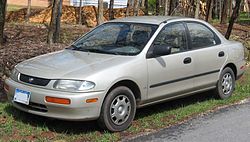
Also called Mazda 323
Mazda Allegro
Mazda Protegé
Mazda ÉtudeProduction 1994–1998, 1995–1999 in Colombia, 1996-2000 in the Philippines Assembly Hiroshima, Japan
Hofu, Japan
Bogotá, Colombia
Pretoria, South Africa,
Paranaque, Philippines (Columbian Autocar Corporation)
Rayong, ThailandBody style 3-door hatchback (Neo)
4-door sedan (Protegé/Familia)
4-door hardtop sedan (Lantis)
5-door hatchback (Lantis/Astina)Layout FF layout Engine 1.3 L B3 I4
1.5 L Z5 I4
1.5 L B5 I4
1.8 L BP I4
1.7 L 4EE1 I4 DieselTransmission 4-speed F-4EAT automatic
5-speed manualWheelbase Hatchback: 2,450 mm (96 in)
1997–98 Sedan: 2,607 mm (102.6 in)Length Hatchback: 4,155 mm (163.6 in)
1997–98 Sedan: 4,440 mm (175 in)
1995–96 Sedan: 4,435 mm (174.6 in)Width 1997–98 Sedan: 1,710 mm (67 in)
1995–96 Sedan: 1,694 mm (66.7 in)
Hatchback: 1,670 mm (66 in)Height 1995–96 ES Sedan: 1,381 mm (54.4 in)
1997–98 Sedan: 1,420 mm (56 in)
1995–96 Sedan: 1,386 mm (54.6 in)
Hatchback: 1,380 mm (54 in)Related Mazda 323F/Lantis/Allegro
Ford Laser
Ford Escort
Mercury Tracer1996–99 Mazda Familia Wagon (rebadged Nissan Sunny California)The BH model was released for the Japanese Domestic Market in 1994 with both front wheel drive and all wheel drive. Production of this generation started on August 8, 1994, and ceased on June 18, 1998.
An unusual JDM model appeared in 1994, with the cancellation of the 1985-generation station wagon. The Mazda Familia Van offered after this year was a rebadged Nissan Wingroad/Sunny California, which was essentially the station wagon version of the Nissan Sunny.[26]
This generation of Familia grew considerably, with the four-door sedan's wheelbase only a few millimetres short of the then-current Toyota Camry, a mid-size car.
The rare North American ES model came with the Miata's 1.8-liter twin-cam engine (though the internals were not the same), 4-wheel disc brakes, and dual stabilizer bars. The same car went on sale in Australia in second half of 1994. with fully featured BP-ZE engine. The Protegé became a "compact car" for the 1995 model year in North America.
Engines:
- 1994–1998 – 1.5 L (1,500 cc) Z5, FI, 16-valve DOHC, 89 hp (66 kW; 90 PS) / 97 ft·lb (132 N·m)
- 1994–1996 – 1.8 L (1,800 cc) B8, 114 hp (85 kW; 116 PS) / 115 ft·lb (156 N·m)
- 1994–1996 – 2.0 L (2,000 cc) KF V6, FI, 24-valve DOHC, 144 hp (107 kW; 146 PS) / 132 ft·lb (179 N·m)
- 1995–1999 – 1.3 L (1,300 cc) B3, 74 hp (55 kW; 75 PS) / 77 ft·lb (104 N·m)
- 1995–1999 – 1.8 L (1,800 cc) BP, FI, 16-valve DOHC, 131 hp (98 kW; 133 PS) / 118 ft·lb (160 N·m)
- 1995–1999 – 2.0 L (2,000 cc) RF, Diesel, 8-valve, 71 hp (53 kW; 72 PS) / 94 ft·lb (127 N·m)
Models:
- 4-door sedan (called the Protegé in North America, 323S in Europe, 323-Protegé in Australia and Étude in South Africa)
- 3-door hatchback (Familia Neo in Japan, 323C and 323P (323P being a hatchback version of 323S) in Europe, Laser Lynx as a Ford)
- A tall wagon, called the Familia Van, was also available in Japan.
Familia Neo
The Familia Neo started production for the Japanese domestic market in 1994. Ford released a rebadged version which was mechanically the same although different bumpers, headlights and bonnet were fitted, badged as the Ford Laser Lynx in Japan and Australia. This model was only available as the Ford Laser-Lynx in the Australian market, as Mazda already had the 323 Astina Hatch filling the gap for a hatchback in the Mazda range. Oddly enough to contradict this, Mazda Australia also offered two 323 sedans, the Astina/Lantis hardtop and the 323 Protegé until production of both models ceased in 1998. This was released new in New Zealand as the Mazda Familia Neo. It featured a rear hatch with a divided glass, much like the Honda CR-X. Aesthetically the Familia Neo was very close in looks to a Mazda Lantis/323F and equated to a 2-door version and also shared the Lantis suspension. The top spec Mazda Neo was fitted with a DOHC 1800 cc BP engine which produced around 112 PS (82 kW), and this was the same engine fitted to the base model Mazda Lantis. It was also sold for a single year (1995) in Canada as 323 Neo GS. In Europe it was named Mazda 323C (for coupé) and it was equipped with 1.3 L SOHC (75 HP), 1.5 L DOHC 16V (88 HP), and 1.8 L DOHC 16V (112 HP) engine.
Lantis
Main article: Mazda LantisA five door hatchback and four door sedan, both featuring pillarless doors and distinct sheetmetal from other 323s, was sold in Japan as the Mazda Lantis, in Australia and South Africa as the Mazda 323 Astina, in Colombia as the Mazda Allegro and in Europe as the Mazda 323F. They were built on platforms distinct from the other 323s. The bodyshape was designed by former Porsche designers. The Lantis was on the CB, a minor update of the CA that underpinned the luxury Mazda Xedos 6 and Eunos 500. The European 323F was designated BA, but was actually almost identical to the CB, and had little to do with other B platforms. These models were sold with the 1.5 L and 1.8 L engines seen in the rest of the 323 range, as well as a 2.0 L V6 shared with the Eunos 500.
Eighth generation (BJ; 1998–2003)
Eighth generation (BJ) 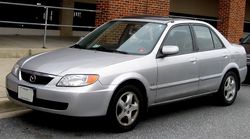
Also called Mazda 323
Mazda Protegé
MazdaSpeed Protegé
Mazda Isamu Genki (Taiwan)
Mazda Allegro
Ford Activa
Ford Lynx
Ford Laser
Ford TierraProduction 1998–2003, 2003–present in, Taiwan, Philippines, China, and Colombia. Assembly Hiroshima, Japan
Hofu, Japan
Pretoria, South Africa
Bogotá, Colombia
Tehran, Iran
Rayong, Thailand[27]Body style 3-door hatchback
4-door sedan
5-door hatchback
5-door wagon (Nissan Wingroad based)Layout Front-wheel drive
Four-wheel drive (Sport 20)Engine 1.3 L B3-ME SOHC I4
2.0 L FS-DET Turbo DOHC I4
1.5 L ZL-DE DOHC I4
1.5 L ZL-VE S-VT I4
1.6 L ZM-DE DOHC I4
1.8 L FP-DE DOHC I4
2.0 L RF Diesel I4
2.0 L FS-DE DOHC I4Transmission 4-speed F-4EAT
4-speed 4F27E automatic
5-speed manualWheelbase 2,610 mm (103 in) Length 1999–2000 Protegé: 174.0 in (4,420 mm)
2001–03 Protegé: 175.3 in (4,453 mm)
Protegé5: 170.5 in (4,331 mm)
2001–03 Wagon: 4,265 mm (167.9 in) 1999–2000 Wagon: 4,215 mm (165.9 in)
2001–03 Sedan: 4,365 mm (171.9 in)
1999–2000 Sedan: 4,315 mm (169.9 in)
Mazdaspeed & MP3: 4,435 mm (174.6 in)Width 1,705 mm (67.1 in) Height Sedan: 1,410 mm (56 in)
Wagon: 1,470 mm (58 in)
Mazdaspeed & MP3: 55.3 in (1,405 mm)Related Mazda Premacy
Ford Ixion
FAW Haima FamilyA redesigned eighth-generation BJ Familia was introduced on June 9, 1998 as a 1999 model. Body styles included a 4-door sedan, 5-door S-Wagon (sold as the Protegé5 in the United States and Canada, and Astina NU in some Asian countries), 3-door hatchback, and traditional 5-door Wagon. A 4EC automatic transmission and two 5-speed manual transmissions were available. All-wheel drive is optional.
The 1999 BJ platform was updated with a 4-door sedan or 5-door hatchback chassis based on the larger Mazda 626 and offered with more engine choices. The Japanese Mazda Familia had all-wheel drive as an option. In America, the ES's engine was still 1.8 liters, but for the eighth generation it was a smaller version of the 626's engine (the FP) rather than the sportier engine shared with the Miata which had been used previously. The rear disc brakes of the ES were downgraded to drums.
The Familia Van and Familia Business Wagon were introduced for 2000, and continued to be supplied by Nissan under an OEM deal, based on the Wingroad.
The entire line was updated for 2001 with new styling, a revised suspension, and a new audio system.
A 2.0 L gas engine appeared in 2001 on the Japanese market Sport 20. A tall wagon version of the Familia called the Mazda Premacy was was sold in Japan as the Ford Ixion. In 1999, Ford of Japan ceased to market Mazda-based models, and the Ford Laser, along with the Ixion, Telstar and Festiva, was dropped.
For the 2001 model year in North America, Mazda introduced the limited-edition Protegé MP3 featuring a new sport-tuned suspension, 17 inch Racing Hart wheels, and a 10 hp (7 kW; 10 PS) gain for a total of 140 hp (104 kW; 142 PS), which was achieved through a tuned factory ECU which advances ignition timing requiring high octane rating gasoline, cat-back exhaust by Racing Beat, and removal of the Mazda VTCS system. The MP3 also came from the factory with a complete 450-watt Kenwood powered MP3 stereo with 10-inch (250 mm) powered subwoofer. A total of 1,500 were produced – 1,000 finished in blue, and 500 painted yellow.
The 2001 Protegé were face lifted, with the ES models receiving rear disc brakes and a stiffer suspension. The 1.8 L engine was increased to 2.0 L for the ES models, and was optional on the LX model, becoming the 2.0LX. The standard 2001 Protegé LX engine was the carryover 1.6 L ZM-DE.
2001 saw the introduction of a station wagon version called Protegé5 with the same 2.0 L engine offering 130 hp (97 kW; 132 PS) / 135 ft·lb (183 N·m) this year and a slightly revised interior.
In 2002, most Protegés (including the 5) received the 2.0 L engine, although the SE in Canada had the 1.6 L.
In 2003, Mazdaspeed introduced the Mazdaspeed Protegé, an update to the Protegé MP3 that had a 170 hp (127 kW; 172 PS) / 160 ft·lb (217 N·m) turbocharged engine, shared the MP3's full Racing Beat suspension, redesigned 17-inch (430 mm) wheels, larger four-wheel disc brakes, and a Kenwood stereo system that included an amplifier along with a rear-deck mounted 8-inch (200 mm) sub. Mazda then followed with a mid year change dubbed the "2003.5." This model included a different aero-kit, the same 17-inch (430 mm) Racing Hart wheels, but with a darker color, and custom interior pieces. In total, there were 4,500 Mazdaspeed Protegé models produced of which 1,750 were painted Black/Orange for first version and 2,750 of the mid-year model that were finished in Yellow/Titanium/Blue/Silver.
The 2003 ES model received a tiptronic automatic transmission as an option, as well as a new wheel design appearing on models with the 15-inch (380 mm) alloy rim option. This was also the last year of production for the Protegé.
The eighth generation went into production on September 29, 1998, and ended on October 2, 2003. However, this version remains in production in Taiwan as the Mazda Genki (sold as hatch and sedan and with little or no styling differences to the original 1998 production model). It is also badged as the Ford Activa, which, unlike the Ford Laser, has no styling changes from the 323, except for the badges. In Southeast Asia, a version of the last Laser is still assembled in Indonesia, Malaysia, and the Philippines as the Ford Lynx.
This generation is also still in production in some South American countries (Ecuador, Colombia, and Venezuela), badged as the Mazda Allegro. Each Allegro keep in the styling of the last generation 323/Protegé/Astina/Familia. In Colombia, production of the Mazda 323 continued until 2003, built by its local subsidiary, the Compañía Colombiana Automotriz.
Chinese company FAW Haima Automobile Co., Ltd. produces a restyled version of 323 called Haima Family. It is equipped with a 1.6 L gasoline engine mated with either a 5-speed manual gearbox or 4-speed automatic gearbox.
The Familia was replaced by the new model known as Axela/Mazda3 for 2004. The Axela/Mazda3 comes in both 4-door sedan and 5-door hatchback varieties, with a 2.0 litre engine on the 3i sedan and a 2.3 litre engine on the 3s sedan and the hatchback. It shares a platform with the current generation Volvo S40 and the second generation Ford Focus.
Engines:
- 1.3 L B3-ME SOHC I4
- 1.5 L ZL-DE DOHC I4
- 1.5 L ZL-VE S-VT I4
- 1.6 L ZM-DE DOHC I4
- 1.8 L FP-DE DOHC I4
- 2.0 L FS, 130 hp (97 kW; 132 PS) / 135 ft·lb (183 N·m)
- 2.0 L FS-ZE (2001 Sport 20)
- 2.0 L RF Diesel
References
- ^ "History of Familia: Development Story, p. 1". Mazda Motor Co. http://www.mazda.co.jp/philosophy/history/familia/story/index.html. Retrieved 2010-11-01.
- ^ a b c
Tanegawa, Takeshi (長谷川) (June 2007). "Mazda Familia Model SSA" (in Japanese). Letter from Toyota Museum (トヨタ博物館だより) (Toyota Motor Corporation) (71): 5–7. http://www.toyota.co.jp/Museum/data/magazine71/magazine71_5.pdf. Retrieved 2011-07-16. - ^ a b c "History of Familia: Development Story, p. 2". Mazda Motor Co. http://www.mazda.co.jp/philosophy/history/familia/story/p2.html. Retrieved 2010-10-04.
- ^ "History of Familia: Development Story, p. 3". Mazda Motor Co. http://www.mazda.co.jp/philosophy/history/familia/story/p3.html. Retrieved 2010-10-05.
- ^ a b Gazoo.com. "Great Car Pavilion: '64 Mazda Familia Wagon" (in Japanese). Toyota Motor Corporation. http://gazoo.com/meishakan/meisha/shousai.asp?R_ID=8573. Retrieved 2011-06-16.
- ^ a b c d (in Japanese) 絶版車カタログ 国産車編 Part1 1950~1969 (Eichi Mook) [Japanese Vintage Car Guide: Car Catalog part 1, 1950–1969]. Eichi Publishing (英知出版). 1996. p. 63. ISBN 4-7542-5055-9.
- ^
Ishikawa, Makiteru (石川県禧照) (October 1993). Tsuji, Kohju (辻 好樹). ed. "トップセラーを誇ったタフボーイ [Tough boy boasting top sales]" (in Japanese). Nostalgic Hero (Tokyo: Geibunsha Publishing) 39 (10): 17–20. 07311-10. - ^ a b (in Italian) Quattroruote Speciale: Tutte le Auto del Mondo 1967. Milano: Editoriale Domus. February 1967. p. 846.
- ^ Sales brochure for Mazda Familia Rotary Coupe at my.reset.jp Retrieved on 26 July 2011
- ^ Mazda Familia Pickup at japanesenostalgiccar.com Retrieved on 26 July 2011
- ^ a b c Mazda Familia Rotary, 1968-1973 at www.carsinpictures.com Retrieved on 26 July 2011
- ^ Howard, Geoffrey; Robson, Graham (10 October 1968). "55th Paris Salon". Autocar 129 (3791): 90–97.
- ^ Development of Low-Emission Rotary Engines Retrieved from www.mazda.com on 27 July 2011
- ^ "Kia Models". Edmunds.com. http://www.edmunds.com/kia/. Retrieved 2011-08-15.
- ^ a b c Ho-Jeong, Lee (2009-10-05). "Blast From the Past #7: Aiming for broader market, Kia scored big with four-wheeled Brisa". Korea JoongAng Daily. http://joongangdaily.joins.com/article/view.asp?aid=2910850. Retrieved 2011-08-15.
- ^ "Graduate Information Brochure". Kia Motors (UK). 2010. p. 5. http://www.kia.co.uk/About-Kia/Careers/2010-graduate-scheme/~/media/Graduate%20Scheme/pdf/Graduate-Information-Brochure.ashx.
- ^ So, Rachel K. (2008-09-24). "Samsung Transportation Museum". Rachel's Random Ramblings. http://rachelkso.blogspot.com/2008/09/samsung-transportation-museum.html. Retrieved 2011-07-16.
- ^ a b Kia UK Graduate Information Brochure, p. 4
- ^ Stern, Joseph J.; Kim, Ji-hong; Perkins, Dwight H.; Yoo, Jung-ho (1995). Industrialization and the State: The Korean Heavy and Chemical Industry Drive. Cambridge, MA: Harvard Institute for International Development. p. 160. ISBN 0-674-45225-9.
- ^ a b Car Graphic: Car Archives Vol. 5, '70s Japanese Cars. Tokyo: Nigensha. 2007. p. 93. ISBN 978-4-544-09175-5.
- ^ "Mazda launches new locally-produced passenger car for Indonesian market. (Mazda MR90) (product announcement)". HighBeam Research: Online Press Releases. PR Newswire Association. December 4, 1990. http://www.highbeam.com/doc/1G1-9649533.html.
- ^ a b Büschi, Hans-Ulrich, ed (March 10, 1983). Automobil Revue '83. 78. Berne, Switzerland: Hallwag, AG. pp. 359–360. ISBN 3-444-06065-3.
- ^ a b (in Japanese) Car Graphic: Car Archives Vol. 11, '80s Japanese Cars. Tokyo: Nigensha. 2007. p. 174. ISBN 978-4-544-91018-6.
- ^ "ファミリア∞" (in Japanese). Geocities.jp. http://www.geocities.jp/yone1216jp/bg.htm. Retrieved 2010-10-05.
- ^ "323/Protege Factory Service Manuals and Familia Brochures". Ferdster.com. http://www.ferdster.com/FSM_PDFS/fsm_pdfs.html. Retrieved 2010-10-05.
- ^ Sanu, Munehiro (佐野弘宗). "試乗レポート: 新型ADで、ライトバン界の政権奪取を狙え! [Test drive report: The new AD, aiming at a van world takeover!]" (in Japanese). Carview. http://www.carview.co.jp/road_impression/2007/nissan_ad/. Retrieved 2010-10-05.
- ^ "Facilities | Ford Motor Company Newsroom". Media.ford.com. http://media.ford.com/plant_display.cfm?plant_id=49. Retrieved 2010-10-05.
« previous — Mazda road car timeline, 1990s–present Type 1990s 2000s 2010s 0 1 2 3 4 5 6 7 8 9 0 1 2 3 4 5 6 7 8 9 0 1 Kei car Carol Carol Carol Carol Carol AZ-Wagon AZ-Wagon AZ-Wagon AZ-Wagon AZ-Offroad Spiano Scrum Scrum/Scrum Wagon Scrum/Scrum Wagon Subcompact Revue/121 Demio/121 Demio/Mazda2 Demio/Mazda2 Verisa Compact Familia/323/Protegé Familia/323/Protegé Familia/323/Protegé Axela/Mazda3 Axela/Mazda3 Familia Van Familia Van Familia Van Mid-size Capella/626 Capella Capella/626 Atenza/Mazda6 Atenza/Mazda6 Cronos/626/Xedos 6/Eunos 500 Eunos 800/Xedos 9/Millenia Mazda6 (N.America) Full-size Sentia/929/Efini MS-8 Sentia Sports car AZ-1 MX-3 Precidia Roadster/MX-5/Miata Roadster/MX-5/Miata Roadster/MX-5 MX-6/Mystère MX-6/Mystère/Efini MS-6 RX-7 Efini RX-7/RX-7 RX-8 Cosmo Minivan Premacy Premacy/Mazda5 Premacy/
Mazda5Bongo Friendee Biante Efini MPV/MPV MPV MPV/Mazda8 Crossover CX-7 CX-9 SUV Navajo Tribute Tribute Pickup B-Series B-Series B-Series BT-50 BT-50 Van Bongo Bongo Mazda automobile timeline, North American market, 1980s–present Type 1980s 1990s 2000s 2010s Model year 0 1 2 3 4 5 6 7 8 9 0 1 2 3 4 5 6 7 8 9 0 1 2 3 4 5 6 7 8 9 0 1 Subcompact GLC GLC Mazda2 323 323/Protegé Compact Protegé Protegé Mazda3 Mazda3 626 626 626 Mid-size 626 626 Mazda6 Mazda6 Millenia Full-size 929 929 Sport compact MX-3 MX-6 MX-6 Sports MX-5 Miata MX-5 Miata MX-5 RX-7 RX-7 RX-7 RX-8 Minivan Mazda5 MPV MPV Mid-size crossover CX-7 Full-size crossover CX-9 SUV Navajo Tribute Tribute Pickup B-Series B-Series B-Series B-Series Categories:- Mazda vehicles
- Compact cars
- Sedans
- Hatchbacks
- Station wagons
- Coupes
- Subcompact cars
- Front wheel drive vehicles
- Rear wheel drive vehicles
- Vehicles introduced in 1964
- Kia vehicles
Wikimedia Foundation. 2010.

